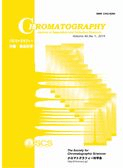
Chromatography
metrics 2024
Empowering researchers with pivotal insights in chromatography.
Introduction
Chromatography is an esteemed journal published by the SOC CHROMATOGRAPHIC SCIENCES, dedicated to advancing the field of chromatographic techniques and their applications across various disciplines, including analytical chemistry, biochemistry, and environmental science. By facilitating the exchange of high-quality research, Chromatography plays a pivotal role in enhancing methodologies and technologies that drive innovation in sample analysis. While the journal is not currently open access, it maintains a rigorous peer-review process, ensuring the publication of valuable and impactful studies. Researchers, professionals, and students alike can benefit from its comprehensive coverage of chromatography-related advancements, making it a vital resource for anyone engaged in this dynamic area of study.
Metrics 2024
 -
- 1.80
1.80 1.30
1.30 -
-Metrics History
Rank 2024
IF (Web Of Science)
JCI (Web Of Science)
Quartile History
Similar Journals
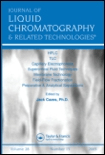
JOURNAL OF LIQUID CHROMATOGRAPHY & RELATED TECHNOLOGIES
Exploring Innovations in Liquid ChromatographyJOURNAL OF LIQUID CHROMATOGRAPHY & RELATED TECHNOLOGIES, published by Taylor & Francis Inc, is a pivotal platform for disseminating cutting-edge research in the field of liquid chromatography and its applications across various disciplines including analytical chemistry, biochemistry, and pharmaceutical science. With an ISSN of 1082-6076 and an E-ISSN of 1520-572X, this journal serves as an essential resource for researchers, professionals, and students committed to advancing the understanding and development of chromatographic techniques. Despite not being an open access publication, the journal features a robust submission process from 1996 to 2024, ensuring comprehensive coverage of historical and contemporary methodologies. Notably, it has achieved rankings in the Q3 and Q4 quartiles across various categories, reflecting its reputable position in the field. It’s recognized within key databases, with Scopus ranks indicating its influential role in areas such as pharmaceutical science and analytical chemistry. This journal is not only a cornerstone for specialized studies but also fosters interdisciplinary collaborations, making it an invaluable asset for the scientific community.

LCGC EUROPE
Advancing chromatographic science for a brighter tomorrow.LCGC EUROPE is a prominent journal dedicated to the field of analytical chemistry, specifically highlighting the latest trends and innovations in chromatographic techniques. Published by MJH Life Sciences, this journal has served as a valuable resource for researchers, professionals, and students interested in the nuances of laboratory practices and the advancement of instrumentation. Although LCGC EUROPE ceased its coverage in Scopus from 2018, it has maintained a significant influence within the community, evidenced by its Scopus rank of 90/114 in Analytical Chemistry, placing it in the 21st percentile. With its inception dating back to 1996, the journal provided essential insights and peer-reviewed articles, fostering a rich understanding of chromatographic science. While the journal is not currently open access, it remains an integral part of the literature for anyone engaged in the analytical chemistry landscape, especially as it pertains to laboratory methodologies and innovations.
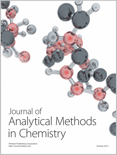
Journal of Analytical Methods in Chemistry
Pioneering research in the realm of analytical chemistry.The Journal of Analytical Methods in Chemistry, published by HINDAWI LTD, stands as a premier platform dedicated to the dissemination of research in the vibrant field of analytical chemistry. With an ISSN of 2090-8865 and an E-ISSN of 2090-8873, this Open Access journal has been committed to providing unrestricted access to quality research since 1978, thereby fostering greater collaboration and innovation among researchers, professionals, and students globally. The journal showcases rigorous research insights spanning diverse categories, earning impressive Scopus rankings including Q2 in Chemical Engineering and Q3 in Analytical Chemistry for 2023, positioning itself effectively among respected peers. Its interdisciplinary approach also covers significant contributions in the realms of instrumentation and computer science applications, thus addressing contemporary challenges and advancements in analytical methodologies. By bridging theoretical underpinnings with practical applications, the Journal of Analytical Methods in Chemistry aims to catalyze knowledge exchange while enhancing the global discourse in analytical science.
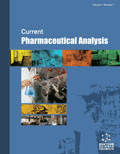
Current Pharmaceutical Analysis
Unlocking Innovations in Drug DevelopmentCurrent Pharmaceutical Analysis, published by Bentham Science Publishers Ltd, is a vital resource for professionals and researchers in the fields of Pharmaceutical Science, Biochemistry, and Molecular Medicine. Established in 2006, this peer-reviewed journal aims to provide a platform for the latest advancements and analytical methodologies in pharmaceutical research and drug development. Over the years, it has garnered attention for its rigorous scrutiny and contributions to the landscape of pharmacology, evidenced by its quartile placements in various categories, most notably Q3 in Pharmaceutical Science. Despite its current rankings placing it in the lower quartile in several disciplines, the journal remains an essential venue for both emerging and established researchers seeking to disseminate their findings. With the widespread accessibility of its articles, researchers, professionals, and students can engage with cutting-edge studies to foster innovation in pharmaceutical analysis. For access to the latest research contributions, readers can explore the digital archive and stay updated on pivotal discussions shaping the future of the pharmaceutical sciences.

Food Analytical Methods
Unveiling the science behind food quality and safety.Food Analytical Methods, published by Springer, is an esteemed journal dedicated to the innovative field of analytical methodologies within the food sciences. With an ISSN of 1936-9751 and E-ISSN of 1936-976X, this journal serves as a pivotal platform for researchers and professionals to exchange insights, methodologies, and findings related to food quality analysis, safety measures, and innovative technologies in food science. As of 2023, Food Analytical Methods boasts impressive Scopus rankings, including Q2 in Analytical Chemistry and Food Science, positioning it among the top journals in its category. The journal's commitment to enhancing food safety and quality through rigorous research underscores its importance in both academic and industrial applications. Although it does not currently operate under an open-access model, it provides exceptional value through its rigorous peer-review process and comprehensive publication standards, further inviting contributions from both established and emerging scientists in the field. With coverage spanning from 2008 to 2024, this journal continues to address critical research areas, thereby shaping the future of food analytics.

JPC-JOURNAL OF PLANAR CHROMATOGRAPHY-MODERN TLC
Transforming Research in Thin-Layer Chromatography.JPC-JOURNAL OF PLANAR CHROMATOGRAPHY-MODERN TLC, published by Springer Heidelberg, is a pivotal resource in the fields of Analytical Chemistry, Biochemistry, and Clinical Biochemistry. With an ISSN of 0933-4173 and an E-ISSN of 1789-0993, this journal serves as an essential platform for the dissemination of innovative research on planar chromatography techniques, specifically modern thin-layer chromatography (TLC). With its upcoming coverage extending to 2024 and a third quartile ranking (Q3) across major scientific categories in 2023, it addresses the critical advancements and applications in analytical methods. Although it does not offer open access, the journal's rigorous peer-review process ensures high-quality findings that contribute to the progression of these vital scientific disciplines. The journal is located in Heidelberg, Germany, and continues to be a beacon for researchers, professionals, and students who seek to enhance their knowledge and practice in chromatographic techniques.

BUNSEKI KAGAKU
Exploring the Depths of Analytical TechniquesBUNSEKI KAGAKU, published by the Japan Society Analytical Chemistry, is a reputable journal dedicated to the field of analytical chemistry. With an ISSN of 0525-1931, this journal has been a crucial outlet for scholarly communication since its inception in 1952, converging its publication years from 1954 to 1957 and from 1959 to 2024. Although it holds a Q4 category ranking in the most recent 2023 quartiles of analytical chemistry and ranks 153/156 in Scopus, it continues to serve as a platform for quality research, fostering advancements in the field. BUNSEKI KAGAKU is based in Tokyo, Japan, and emphasizes the critical importance of analytical techniques in scientific inquiry. With a commitment to professionalism and rigor, the journal provides a vital resource for researchers, students, and professionals seeking to explore innovative methodologies and contribute to the ongoing dialogue in analytical chemistry.

Separations
Unveiling Breakthroughs in Analytical and Separation TechniquesSeparations is a prestigious open-access journal published by MDPI, dedicated to advancing the fields of analytical chemistry and filtration and separation processes. Established in 2014, the journal has swiftly emerged as a significant platform for disseminating groundbreaking research and innovative methodologies in separation science, boasting an impressive E-ISSN of 2297-8739 and operating out of Basel, Switzerland. With its focus rotating from 2016 through 2024, Separations has been categorized in the Q3 quartile for both analytical chemistry and filtration and separation disciplines as of 2023, demonstrating its relevance in these scientific areas. The journal's rankings in Scopus, with 93rd out of 156 in analytical chemistry and 15th out of 19 in chemical engineering filtration and separation, reflect its commitment to high-quality research accessible to a global audience. Researchers, professionals, and students will find valuable insights and pioneering findings that foster collaboration and innovation within the vibrant community of separation science.

CHINESE JOURNAL OF ANALYTICAL CHEMISTRY
Empowering Research through Analytical InsightsCHINESE JOURNAL OF ANALYTICAL CHEMISTRY, published by SCIENCE PRESS in China, stands as a prominent platform in the field of analytical chemistry since its inception in 1989. With its ISSN 0253-3820 and E-ISSN 1872-2040, the journal maintains a vital role in disseminating empirical research and innovative methodologies, contributing to the advancement of analytical techniques and their applications. The 2023 Scopus ranking positions the journal in the third quartile (Q3) within its category, reflecting a respectable standing among its peers. Researchers, professionals, and students alike engage with a broad range of topics, from instrumental analysis to environmental monitoring, each aiming to foster further scientific inquiry. Although it does not currently offer Open Access, the journal's rich repository of knowledge continues to be an essential resource for those in the analytical chemistry community, with an enduring commitment to scientific excellence and collaboration.
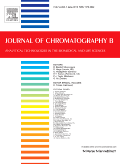
JOURNAL OF CHROMATOGRAPHY B-ANALYTICAL TECHNOLOGIES IN THE BIOMEDICAL AND LIFE SCIENCES
Pioneering Research at the Intersection of Chemistry and Life SciencesJOURNAL OF CHROMATOGRAPHY B-ANALYTICAL TECHNOLOGIES IN THE BIOMEDICAL AND LIFE SCIENCES, published by Elsevier, stands as a critical resource in the fields of analytical chemistry, biochemistry, and life sciences. With an impressive convergence of research spanning from 2002 to 2024, this journal delivers high-quality, peer-reviewed articles that advance the methodologies and practices related to chromatographic techniques and their applications in biomedical research. The journal enjoys a reputable standing in the academic community, reflected in its 2023 Scopus rankings—ranked in the 65th and 55th percentiles in Analytical Chemistry and Clinical Biochemistry, respectively. Although it does not offer open access, it provides a vital platform for exchanging innovative ideas and findings, guiding professionals and scholars in addressing the complexities of contemporary biomedical challenges. The journal’s focus on interdisciplinary research positions it as an essential tool for researchers, professionals, and students eager to enhance their knowledge and contribute to advancements in this dynamic field.